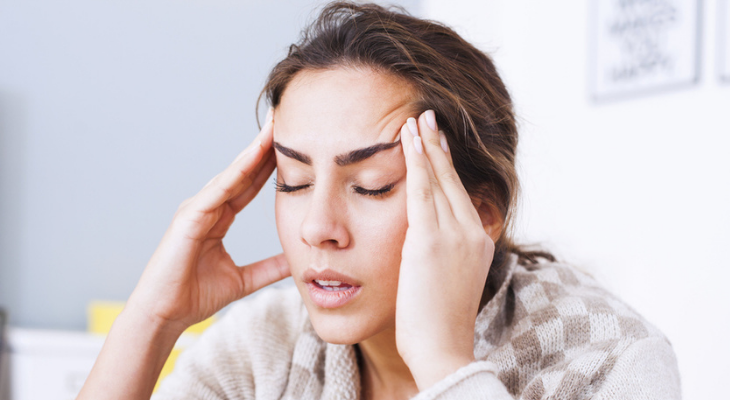
How to Avoid and Treat Tension Headaches
Popping pain relievers temporarily dulls the pain and pressure of tension headaches, but the relief is short-lived. As soon as the medication wears off, your headache pain returns. Fortunately, lifestyle changes and chiropractic treatment can end your reliance on pain medication and reduce the number of tension headaches you get.
Tension Headache Symptoms and Causes
Tension headache pain starts in your forehead and wraps around the back of the neck. Also known as "hatband" headaches, tension headaches are the most common type of headache disorder, according to the World Health Organization.
Pain and pressure aren't the only symptoms of the headaches. After a few hours of pain, the muscles in your neck, shoulders and jaw tighten or spasm, which only worsens the headache. Fatigue, irritability and sensitivity to light can also occur.
Tension headaches have many causes, including:
- Stress. Stress, a common cause of tension headaches, tightens the muscles in your head, neck and shoulders, triggering headache pain. Your stress level affects how much pain you feel and the length of your headache, according to a study published in Middle East Current Psychiatry in 2020. As your stress level rises, tension headaches become more intense and last longer.
- Posture. Slouching or holding your head too far forward or at an angle may also increase your risk of tension headaches. Text neck, a condition that's related to the use of digital devices, can also lead to tension headaches. Bending your head down to look at your phone or digital device exerts excessive pressure on your neck, spine, muscles, ligaments and tendons, causing tension headaches and neck pain.
- Subluxations. Subluxations are misalignments of the vertebrae in your spine. The misalignments can be caused by poor posture, falls, playing sports, the way you sleep or even your habit of crossing your legs. Subluxations cause pain by pressing on nerves and also trigger imbalances that tighten muscles and tissues.
- Jaw or Teeth Issues. Your frequent headaches may be caused by temporomandibular joint dysfunction (TMJ), a misaligned jaw or a problem with your bite (the way your upper and lower teeth fit together). If your jaw or teeth aren't properly aligned, the muscles in your face and neck may tighten painfully.
Tension headaches may also be due to:
- Anxiety or depression
- Poor sleep
- Drinking too much caffeine or alcohol
- Dehydration
- Hunger
- Fatigue
- Eyestrain
- An illness
What You Can Do About Your Tension Headaches
Like many things, it's much easier to prevent tension headaches than to treat them. Reduce your risk of tension headaches by:
- Lowering Stress. You may not be able to eliminate stress from your life completely, but you can probably take a few steps to decrease it. Reduce stress with exercise, meditation, yoga and hobbies. If those activities don't lower your stress level, talk therapy or cognitive behavioral therapy could help you keep stress under control
- Improving Your Sleep Habits. The American Academy of Sleep Medicine recommends setting a consistent sleep schedule that allows for seven to eight hours of sleep. Keep your bedroom cool, dark and quiet and invest in a comfortable mattress and pillows.
- Eating Healthier. Limit junk food and fatty, fried or processed foods. Fill your plate with whole grains, fruits, vegetables, healthy fats, and poultry, fish or lean meat. Drink water instead of sugary or caffeinated beverages to prevent dehydration.
- Focusing on Posture. Correcting your posture is one of the simplest ways to decrease your tension headaches. Keep your head and shoulders back, your knees straight and your stomach tucked in. Picture an imaginary string pulling on your head and keeping it aligned over your shoulders.
- Making an Appointment for an Adjustment. Adjustments (spinal manipulation) at the chiropractic office ease tension headache pain and help you avoid headaches in the future. Subluxations in the upper neck and back can cause muscle spasms that trigger tension headaches. Correcting these subluxations stops the spasms and the headaches. Your chiropractor may also recommend trigger point therapy if your tension headaches are caused or worsened by knots in your muscles.
- Scheduling Regular Massages. Massage, another therapy offered by your chiropractor, relaxes tight muscles in your head and neck, relieves stress and eases tension headache pain.
Are you tired of living with tension headaches? Relieve your pain naturally with chiropractic care.
Sources:
World Health Organization: Headache Disorders, 4/8/2016
American Academy of Sleep Medicine: Healthy Sleep Habits, 8/2020
